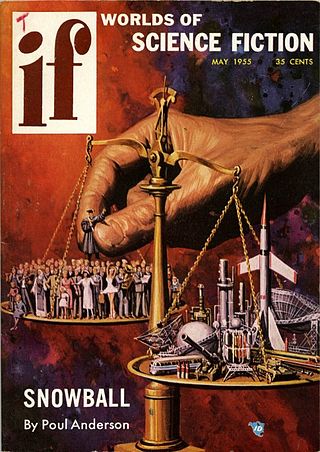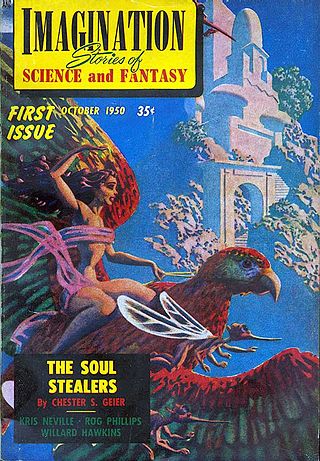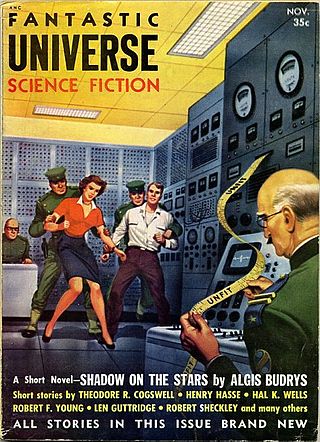Related Research Articles

Eric Frank Russell was a British writer best known for his science fiction novels and short stories. Much of his work was first published in the United States, in John W. Campbell's Astounding Science Fiction and other pulp magazines. Russell also wrote horror fiction for Weird Tales and non-fiction articles on Fortean topics. Up to 1955 several of his stories were published under pseudonyms, at least Duncan H. Munro and Niall(e) Wilde.

If was an American science fiction magazine launched in March 1952 by Quinn Publications, owned by James L. Quinn.

Interzone is a British fantasy and science fiction magazine. Published since 1982, Interzone is the eighth-longest-running English language science fiction magazine in history, and the longest-running British science fiction (SF) magazine. Stories published in Interzone have been finalists for the Hugo Awards and have won a Nebula Award and numerous British Science Fiction Awards.

The British Science Fiction Association Limited is an organisation founded in 1958 by a group of British academics, science fiction fans, authors, publishers and booksellers in order to promote the writing, criticism, and study of science fiction in every form. The first President of the BSFA was Brian Aldiss. Pat Cadigan became president in August 2020, and Tade Thompson became the Vice President in June 2021.
Edward Frederick James is a British scholar of medieval history and science fiction. He is Emeritus Professor of Medieval History at University College, Dublin. James received the Hugo Award for his non-fiction book The Cambridge Companion to Science Fiction, and the Pilgrim Award for lifetime contribution to SF and fantasy scholarship.
Science Fiction Studies (SFS) is an academic journal founded in 1973 by R. D. Mullen. The journal is published three times per year at DePauw University. As the name implies, the journal publishes articles and book reviews on science fiction, but also occasionally on fantasy and horror when the topic also covers some aspect of science fiction as well. Known as one of the major academic publications of its type, Science Fiction Studies is considered the most "theoretical" of the academic journals that publish on science fiction.

Infinity Science Fiction was an American science fiction magazine, edited by Larry T. Shaw, and published by Royal Publications. The first issue, which appeared in November 1955, included Arthur C. Clarke's "The Star", a story about a planet destroyed by a nova that turns out to have been the Star of Bethlehem; it won the Hugo Award for that year. Shaw obtained stories from some of the leading writers of the day, including Brian Aldiss, Isaac Asimov, and Robert Sheckley, but the material was of variable quality. In 1958 Irwin Stein, the owner of Royal Publications, decided to shut down Infinity; the last issue was dated November 1958.

Imagination was an American fantasy and science fiction magazine first published in October 1950 by Raymond Palmer's Clark Publishing Company. The magazine was sold almost immediately to Greenleaf Publishing Company, owned by William Hamling, who published and edited it from the third issue, February 1951, for the rest of the magazine's life. Hamling launched a sister magazine, Imaginative Tales, in 1954; both ceased publication at the end of 1958 in the aftermath of major changes in US magazine distribution due to the liquidation of American News Company.
Kevin Smith was an active British science fiction fan from the mid-1970s to the mid-1980s, producing such science fiction fanzines as Drilkjis and Dot, writing for fanzines, chairing British science fiction conventions, editing a 1979 anthology of British fanwriting titled Mood 70 for Seacon '79, the 37th World Science Fiction Convention, and serving from 1980 to 1982 as editor of Vector, the critical journal of the British Science Fiction Association. He won the TransAtlantic Fan Fund in 1982.

Beyond Fantasy Fiction was a US fantasy fiction magazine edited by H. L. Gold, with only ten issues published from 1953 to 1955. The last two issues carried the cover title of Beyond Fiction, but the publication's name for copyright purposes remained as before.

Fantastic Universe was a U.S. science fiction magazine which began publishing in the 1950s. It ran for 69 issues, from June 1953 to March 1960, under two different publishers. It was part of the explosion of science fiction magazine publishing in the 1950s in the United States, and was moderately successful, outlasting almost all of its competitors. The main editors were Leo Margulies (1954–1956) and Hans Stefan Santesson (1956–1960).
Science fiction studies is the common name for the academic discipline that studies and researches the history, culture, and works of science fiction and, more broadly, speculative fiction.

Niall Sidney Harrison is a British medical writer and science fiction editor, critic and publisher. He was a judge of the Arthur C. Clarke Award in 2006 and 2007 and Guest of Honour at Eastercon 2023.
Paul Kincaid is a British science fiction literary critic.

Satellite Science Fiction was an American science-fiction magazine published from October 1956 to April 1959 by Leo Margulies' Renown Publications. Initially, Satellite was digest-sized and ran a full-length novel in each issue with a handful of short stories accompanying it. The policy was intended to help it compete against paperbacks, which were taking a growing share of the market. Sam Merwin edited the first two issues; Margulies took over when Merwin left, and then hired Frank Belknap Long for the February 1959 issue. That issue saw the format change to letter size, in the hope that the magazine would be more prominent on newsstands. The experiment was a failure and Margulies closed the magazine when the sales figures came in.

Ian Sales is a British science fiction writer, editor and founder of the SF Mistressworks website. Although born in the UK, he grew up in the Middle-East, in Qatar, Oman, Dubai and Abu Dhabi.

Nina Allan is a British writer of speculative fiction. She has published five collections of short stories, multiple novella-sized works, and five novels. Her stories have appeared in the magazines Interzone, Black Static and Crimewave and have been nominated for or won a number of awards, including the Grand prix de l'Imaginaire and the BSFA Award.
Anne Charnock is a British author of science fiction novels. In 2018, she won the Arthur C. Clarke Award in science fiction, for her novel Dreams Before the Start of Time.
References
- ↑ "Issue Grid: Vector". isfdb.org. Retrieved 2023-07-27.
- 1 2 "Vector". British Science Fiction Association.
- 1 2 Nicholls, Peter; Roberts, Peter; Langford, David. "Vector". In Clute, John; et al. (eds.). The Encyclopedia of Science Fiction (3rd ed.). Gollancz. Retrieved 28 August 2021.
- ↑ Brian M. Stableford (2004). Historical Dictionary of Science Fiction Literature. Scarecrow Press. p. 448. ISBN 978-0-8108-4938-9 . Retrieved 15 March 2016.
- ↑ "SFE: Vector". The Encyclopedia of Science Fiction . 19 February 2024. Retrieved 2024-11-26.
- ↑ Paul Kincaid and Maureen Kincaid Speller, 'Introduction,' Best of Vector vol. I, BSFA 2015.
- ↑ "Vector index at ISFDB".